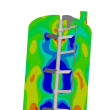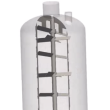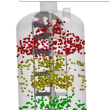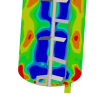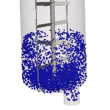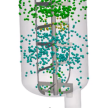Loading...
Project
Friedrich-Alexander-University (FAU)
Sustainable Performance Engineering
Sustainable Performance Engineering (FAU): Performance and scalability have always been central
components of the FEATFLOW software, which has been methodically and algorithmically expanded over
the years. To make FEATFLOW efficient for the upcoming generation of exascale computers, not only
new scaling limits need to be overcome and hardware efficiencies achieved in the co-design of
algorithms and implementations. The developments and implementations must simultaneously be
sustainable and broadly usable with respect to the emerging significantly growing breadth in
computer architectures. Challenges arise here in high degrees of scaling, heterogeneous and complex
node architectures with deep memory hierarchies (including HBM memories also in the CPU area) and
the growing breadth in the CPU processors (especially in the area of x86- and ARM-based systems),
GPU processors (NVIDIA, AMD, Intel Ponte Vecchio) and heterogeneous, flexible concepts like the
EPI. The project follows a co-design approach that can qualitatively or quantitatively evaluate the
efficiency of alternatives in algorithms, data structures and implementations with respect to
fundamental architectural features with performance models (e.g., using SIMD-like concepts or new
memory hierarchies/technologies) and thus allows a targeted selection. For this reason, the project
deliberately uses and possibly further develops analytical models (e.g., Roofline model [84] as
well as ECM model [29, 41, 2]), which enable sustainable decisions in the co-design process. The
machine-specific implementation of performance-critical steps is then carried out taking into
account the performance model and with support from code generation technology [7, 21, 54, 18]. FAU
is involved in several ongoing DFG and EU projects where targeted performance engineering is used,
however the models differ as they must be specialized to the methods and architecture due to the
co-design approach.
